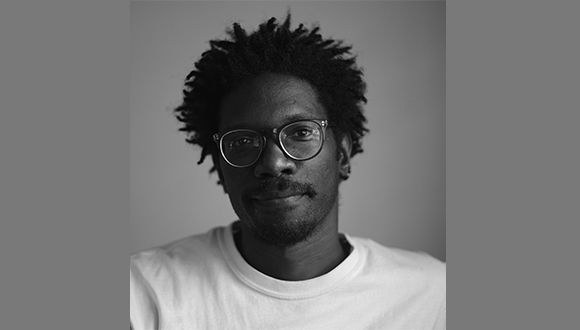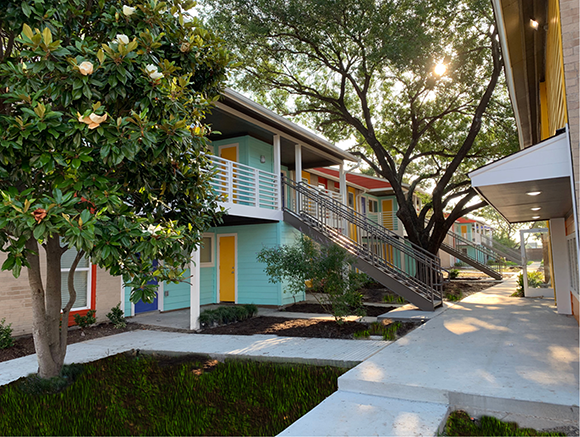 In a Facebook post on his own account, artist Ronald Llewellyn Jones stated that his residency award at the Zócalo Artist-in-Residency Program in Houston has been rescinded before he was to begin the residency. He also stated in the post that it was because of a failed criminal background check, which Glasstire confirmed after reaching out to both Jones and Ileana Yordan, Program Director of the Zócalo program.
In a Facebook post on his own account, artist Ronald Llewellyn Jones stated that his residency award at the Zócalo Artist-in-Residency Program in Houston has been rescinded before he was to begin the residency. He also stated in the post that it was because of a failed criminal background check, which Glasstire confirmed after reaching out to both Jones and Ileana Yordan, Program Director of the Zócalo program.
In our conversation via FB’s Instant Messenger, Jones declined to talk about the details of his past crime: “however, I don’t mind sharing that I was incarcerated for four and a half years [and] convicted of manslaughter and tampering with evidence in 2006,” he writes.
Jones stated that he learned about the cancelled opportunity while in the Zócalo offices; Zócalo ran a background check on Jones while he filled out the residency paperwork. “I feel that to pull away from my being a rightful recipient of the residency allows the apartments to find justification in the [mind] of the public,” Jones states. “It would make it easy for folks to forget that they had not done any background checks during the initial application process, nor the juror process, semi-finalist selection, secondary juror process or finalist announcement preparations. They waited until I was in their offices filling out paperwork.” Jones continues: “It was the tenth anniversary of the last Christmas I spent behind bars and the 14th anniversary of the day I was arrested. So it meant a lot to me to be able to show that to my family.”

When Glasstire reached out to Yordan, she expressed regret. “Zocalo learned an important lesson in this process,” she says. “We learned we must complete background checks much sooner in the selection process before an artist is named as a finalist.”
Below is Yordan’s full statement:
“Artist Ronald Jones was selected as a finalist in the inaugural Zocalo Artist in Residence Program, however, as Jones recently announced on social media he did not pass the final background check and will not move forward to become a resident at Zocalo Apartments.
“Despite our admiration and utmost respect for the artist’s accomplishments and commitment to the artistic community, we could not exempt the artist from the clearly established criteria in which the artist was aware of and consented to. This decision does not discredit Jones as an artist, we recognize his talents and in an effort to support his future we have granted the artist a $1,000 stipend.
“As Houston’s first artist in residence program in a multi-family apartment community, we are committed to making our program a success, even though we know there will be challenges along the way. While multi-family apartments and this residency program may have certain restrictions on resident backgrounds, we are confident our program can have an important role in fostering the artistic and cultural life of Houston. Zocalo learned an important lesson in this process. We learned we must complete background checks much sooner in the selection process before an artist is named as a finalist.”

Jones acknowledges that he accepted the $1000 stipend. “I didn’t want to accept it as it felt like hush money and their residency being fresh having any negative press would be bad. But, I have bills still and they have to be paid.” He continues: “But right now all I’m thinking about are the people that are going to be denied opportunities they are fully qualified for just because they have to check a box.”
Jones faces what most convicted felons in the US face daily, even after they have been released from prison following their convictions. From restrictions on housing, voting, and employment, to loss of eligibility for SNAP benefits and college grants, ex-felons must often work with non-profit charities and other agencies to navigate the system.
The Texas Criminal Justice Coalition (TCJC) website states: ” …while [Texas House Bill 1510, which is now the law in Texas] does not require any landlord to lease property to someone with a criminal record, it encourages landlords to look beyond the mere fact of a criminal record when leasing to individuals.” TCJC’s website report also states:
“This legislation does not preclude legal liability when a landlord leases property to someone convicted of a sexually violent offense, or a violent act under Section 3g, Article 42.12, Texas Code of Criminal Procedure.2 The law, however, does not create a risk of liability that is not already established. Many people convicted of violent offenses have engaged in meaningful rehabilitation, and may be no more a risk than any other applicant for housing.”
Other states and local governments are looking at ways to restore some rights to people who have served time for criminal convictions. Although some of those laws preclude violent crime convictions, and arguably may not have applied to Jones’ situation, most see it as a start.
“People shouldn’t have to pay for their mistakes for the rest of their lives. A fresh start improves an individual’s chances of succeeding and reduces the likelihood of recidivism. Automating the record clearance process will enable former offenders to get back on their feet and lead productive lives,” stated Assembly Member Phil Ting (D-San Francisco) on the occasion of California Governor Gavin Newsom signing of AB 1076, which uses technology to automate arrest and conviction relief for those already entitled to record clearance under existing law. It went into effect on January 1, 2020.
Indianapolis passed a “Second Chance” law in 2013 that allows individuals to restrict access to a portion of their criminal record: “If successful, any case that has been restricted will not show up on a criminal history check by noncriminal justice organizations or individuals. Criminal justice agencies like the court, prosecutor, and police will continue to have access to all information. Although it has been nicknamed an ‘expungement law,’ Indiana’s Second Chance Law only restricts access to criminal records; it does not forever erase or expunge one’s criminal history.”
In some other examples, the 5th US Circuit Court of Appeals heard arguments about a class-action lawsuit last December, alleging that a state’s lifetime ban on restoring voting rights violates the Eighth and Fourteenth Amendments of the US Constitution, and Virginia voted last year to restore the rights of nearly 200,000 formerly incarcerated individuals.
As many Americans have criminal records as have college degrees, and with nearly half of black males and almost 40 percent of white males arrested by age 23, stories like Jones’ are common.
“I wish the remaining artists, and whomever replaces me, the best because I know what the opportunity means for an artist,” Jones says. “It all just begs the question: when is a debt paid?”



16 comments
Completely unfair and wrong, Zocalo needs to clean up their act.
Art is created and grown through life experience. Limiting art, artistic exposure and expression because of a failure on Zocalo’s part is detrimental to our community. Ron’s art and Ron’s person are both benefits to any community, and we are lucky to have him HERE in Houston.
If every space in town ran background checks or truly vetted the artists they bring on board-or if every artist in this town chased down truths of the entities they are breaking backs to work with- people might discover how dark this town really is. I brought Ronald into my business recently on an installation project. He was forthright out of the gate that he had served some time. He created a beautiful piece of work that was enjoyed by a few thousand people. He committed at least 200 hours of time with no compensation to deliver for the event. The pressure and stress that he has to live with because of a mistake he made is nothing short of crushing and something only he only knows the true weight of. I can understand the decision made- but think it’s pretty lame that it was awarded without fully inspecting the application. Ronald served his time. His art is something he can give.
Dear Zocalo Residency,
I read your statement tonight. Your process failed because your system is flawed. If you consider this specific circumstance alone it would point to a new change in your residency policy. Shouldnt a new artist residency serve another purpose as well as helping deserving artists?
such a thoughtful comment. great point.
So why was he denied? Was it a housing policy or a Zocalo policy? If Zocalo receives federal funding are they discriminating? Zocalo has a broken policy.
We are with you Ronnie. We know the type of person you are. Hopefully you will grow stronger after this and keep being the wonderful person you are. Make art Ronnie!
A GoFundMe has been started for Ronald to crowdfund the money he would have saved had the residency not been rescinded. https://www.gofundme.com/f/dbpvm-be-the-change-you-want-to-see?utm_source=facebook&utm_medium=social&utm_campaign=p_cf%20share-flow-1&fbclid=IwAR0pluBNL68L0wknmKMCi5H2FtbU481eMLM2qt6Q1PeVVp_e8Cistv7j5UY
Well, they just ousted one of the friendliest artists in Houston. There was a public vote as part of the selection process. So many of his peers vouching for his work/ character should counteract a 14 year old conviction. He already served time and shouldn’t keep getting punished. Sorry Ronnie, this sucks.
Reminder for artists to be in touch with TALA in these cases: https://talarts.org.
Also, despite Zocalo’s statement in their Guidelines –that residents can be denied residency due to criminal convictions – the law is more complex, as it is wrapped up in the Texas Fair Housing Act (TFHA). I’d be curious to know if, because the Zocalo residency is privately run by a rental developer, and becuase they provide housing, if their residency guidelines must comply with the TFHA.
If so, a quick glance at the TEXAS CRIMINAL BACKGROUND SCREENING GUIDE FOR RENTAL HOUSING PROVIDERS (2018) states the following:
“A housing provider with a tailored policy or practice that excludes individuals with certain types of convictions must still prove that its policy is necessary to serve a substantial, legitimate, and nondiscriminatory interest. The housing provider’s policy with regard to convictions must distinguish between criminal conduct that indicates a demonstrable risk to resident and property safety, and criminal conduct that does not. Moreover, providers must be mindful of the obligation to provide reasonable accommodation for certain applicants. ”
Furthermore:
“If a housing applicant has a criminal conviction on his or her record and the date of the conviction falls outside of the enumerated look-back period, then the applicant should not be denied housing based on the criminal background screening. In no discretionary situation should the enumerated look-back period extend greater than seven (7) years. Research indicates that at seven years past the offense date, the likelihood that a person with a prior criminal record will engage in future criminal conduct decreases to where it approximates the likelihood that a person with no criminal history will engage in criminal conduct.”
The suggested “look-back” period for manslaughter charges is 4 years.
It’s important to support Ronald as an individual artist (and a wonderful person). But it’s also important to follow up with Zocalo about their policy so this never happens again.
That’s their loss. Ronald is a fine human being and artist who’s obviously grown beyond his past by leaps and bounds. No one here can say they aren’t different from who they were 10+ years ago. We all grow and change no matter what past we have.
Ronnie gives beauty to the world, and these policies inaccurately paint people with a past as only ever giving darkness to the world.
Well said! Thank you…
I told you brother, this world can only take away the material things..I see there are a lot of people who know and respect you for WHO YOU ARE!! It’s a major loss to that recidency… Nothing can stop you from reaching your full potential and then some. Keep doing what you do best!! Love you brother…
This is such a shame. I’ve had the pleasure of knowing and working with Ronnie for years and he is genuinely one of the best among us. He deserves recognition for his creative output and generous spirit, not “outed” for something that is now over a decade behind him. Who is this residency for, the benefit of artists, or the developers to attract a certain clientele? So, so disappointed in this.
Ronnie, we support you 10000%.
With you 100% Ronald, you are one of the pillars of our community, and it has been such an honor to work with you on many occasions. You have proven yourself not only one of our city’s best and brightest artists, but also one of its most generous and community driven, and I thank you!
This incident points to some of the same issues the censorship at 500X recently brought to the fore. As Texas’ inner cities gentrify, and more and more both artists, and old and new art institutions and organizations become intertwined with real estate developers who see “art spaces” and artists as adding value to their properties (or as renters in overpriced updated “warehouse studio complex’s” with similarly limiting policies), we again see the way these relationships make uncomfortable and unproductive situations for artists to create truly radical and powerful work. Real estate developers and artists will never make for comfortable bedfellows; due to the almost total power one has over the other—all the while that same party with all the power reaps the majority of cultural and financial capital the artists produce.
The very well described statistics in Christopher’s article also of course point to the inherent inequalities of policies such as the one Ronald was effected by; and just how harmful such policies can be in terms of class and race (in our current cultural climate).
There has more and more recently been the well intentioned desire for artists to create community engaging work by partnering with deeply institutional organizations, cities, and real estate developers to seek deeper connections with communities they hope to reach and work with (of course artists have always had to maintain this uncomfortable connection to power and capital to get said what needs to be said). So, who am I to judge it, anything is worth a try, it’s what artists do; they try things. And it can work out well, though more often it does not (especially for the artist).
So, it does remind me that so much of what has moved art forward are the artists willing to subvert, in all the possible incarnations of that word. And this brings me back to Ronald, his “no permission asked” string installations in public spaces around town remind me of this reality, and of how we as artists are always creating so much of the really important context for our work, time and time again!
Thanks to Ronald and all the artists who do that here and throughout the world!
I agree with the artist. He shouldn’t be punished, he did his time. Time to make sure art is accessible to all.